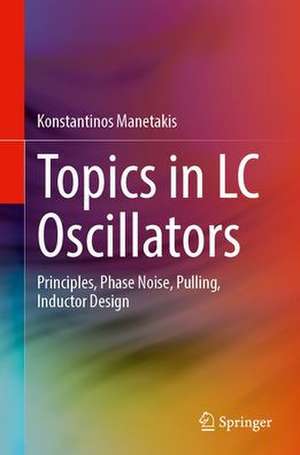Topics in LC Oscillators: Principles, Phase Noise, Pulling, Inductor Design
Autor Konstantinos Manetakisen Limba Engleză Hardback – 20 iun 2023
| Toate formatele și edițiile | Preț | Express |
|---|---|---|
| Paperback (1) | 361.13 lei 3-5 săpt. | +15.14 lei 4-10 zile |
| Springer Nature Switzerland – 21 iun 2024 | 361.13 lei 3-5 săpt. | +15.14 lei 4-10 zile |
| Hardback (1) | 528.30 lei 6-8 săpt. | |
| Springer Nature Switzerland – 20 iun 2023 | 528.30 lei 6-8 săpt. |
Preț: 528.30 lei
Preț vechi: 621.53 lei
-15% Nou
Puncte Express: 792
Preț estimativ în valută:
101.10€ • 105.16$ • 83.47£
101.10€ • 105.16$ • 83.47£
Carte tipărită la comandă
Livrare economică 14-28 aprilie
Preluare comenzi: 021 569.72.76
Specificații
ISBN-13: 9783031310850
ISBN-10: 3031310853
Ilustrații: X, 177 p. 1 illus.
Dimensiuni: 155 x 235 mm
Greutate: 0.44 kg
Ediția:2023
Editura: Springer Nature Switzerland
Colecția Springer
Locul publicării:Cham, Switzerland
ISBN-10: 3031310853
Ilustrații: X, 177 p. 1 illus.
Dimensiuni: 155 x 235 mm
Greutate: 0.44 kg
Ediția:2023
Editura: Springer Nature Switzerland
Colecția Springer
Locul publicării:Cham, Switzerland
Cuprins
Chapter 1. Basics of LC Oscillators.- Chapter 2. Self-Sustained Oscillators.- Chapter 3. Noise in LC Oscillators.- Chapter 4. Thermal Noise in LC Oscillators.- Chapter 5. Low-Frequency Noise in LC Oscillators.- Chapter 6. LC Oscillator Entrainment and Pulling.- Chapter 7. Design of Integrated Inductors.
Notă biografică
Konstantinos Manetakis received a Ph.D. in Analog IC Design from the Imperial College of Science, Technology and Medicine, London, UK, in 1998. From 1998 to 2020, he held various positions with Maxim Integrated Products in Sunnyvale, CA, USA; Qualcomm CDMA Technologies in San Diego, CA, USA; Silicon Labs in Caen, France; Cambridge Silicon Radio in Cambridge, UK, and Sophia-Antipolis France; Marvell Technologies in Etoy, Switzerland, and GlobalFoundries in Rolle Switzerland. Since 2020 he has been with CSEM in Neuchatel, Switzerland, as a RF System Architect working on low-power wireless transceivers for connectivity applications. His interests include Analog, RF, and mm-wave integrated circuits and systems
Textul de pe ultima copertă
This book introduces an intuitive, self-sustained oscillator model and applies it to describe some of the most critical performance metrics of LC oscillators, such as phase noise, entrainment, and pulling. It also covers the related topics of magnetic coupling and inductor design. The author emphasizes the basic principles and illuminates them with approximate calculations, adopting a design-oriented approach that imparts intuition and complements simulations. This book constitutes a novel and fresh perspective on the subject and can be helpful to electrical engineering students and practicing engineers. It also serves as a bridge between the mathematical treatises of the subject and the more practical circuit-oriented approaches.
- Introduces the Van der Pol self-sustained oscillator model and explains its use to describe practical LC oscillators.
- Discusses the fundamentals of oscillator noise using the complementary approaches of dissipation and fluctuation.
- Models the oscillator as a phase point moving along its limit cycle and introduces the Phase Dynamics Equation.
- Explains the noise to phase noise conversion as a two-step process and delves into computing phase noise due to tank noise, transconductor thermal and flicker noise, supply, and bias noise.
- Highlights the vital role of the oscillator's common-mode behavior in converting low-frequency noise to phase noise.
- Applies the Phase Dynamics Equation to describe oscillator entrainment and pulling.
- Discusses methods to reduce magnetic coupling and includes a self-contained introduction to the design of integrated inductors.
Caracteristici
Introduces the Van der Pol self-sustained oscillator model and explains its use to describe practical LC oscillators Discusses the fundamentals of oscillator noise using the complementary approaches of dissipation and fluctuation Models the oscillator as a phase point moving along its limit cycle and introduces the Phase Dynamics Equation
